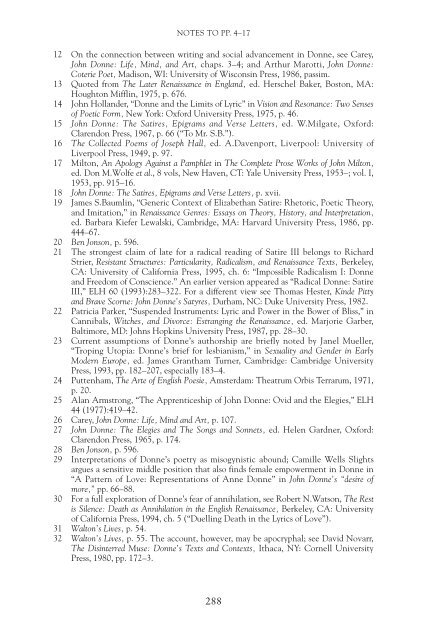ENG LYRIC POETRY.pdf - STIBA Malang
ENG LYRIC POETRY.pdf - STIBA Malang
ENG LYRIC POETRY.pdf - STIBA Malang
Create successful ePaper yourself
Turn your PDF publications into a flip-book with our unique Google optimized e-Paper software.
NOTES TO PP. 4–17<br />
12 On the connection between writing and social advancement in Donne, see Carey,<br />
John Donne: Life, Mind, and Art, chaps. 3–4; and Arthur Marotti, John Donne:<br />
Coterie Poet, Madison, WI: University of Wisconsin Press, 1986, passim.<br />
13 Quoted from The Later Renaissance in England, ed. Herschel Baker, Boston, MA:<br />
Houghton Mifflin, 1975, p. 676.<br />
14 John Hollander, “Donne and the Limits of Lyric” in Vision and Resonance: Two Senses<br />
of Poetic Form, New York: Oxford University Press, 1975, p. 46.<br />
15 John Donne: The Satires, Epigrams and Verse Letters, ed. W.Milgate, Oxford:<br />
Clarendon Press, 1967, p. 66 (“To Mr. S.B.”).<br />
16 The Collected Poems of Joseph Hall, ed. A.Davenport, Liverpool: University of<br />
Liverpool Press, 1949, p. 97.<br />
17 Milton, An Apology Against a Pamphlet in The Complete Prose Works of John Milton,<br />
ed. Don M.Wolfe et al., 8 vols, New Haven, CT: Yale University Press, 1953–; vol. I,<br />
1953, pp. 915–16.<br />
18 John Donne: The Satires, Epigrams and Verse Letters, p. xvii.<br />
19 James S.Baumlin, “Generic Context of Elizabethan Satire: Rhetoric, Poetic Theory,<br />
and Imitation,” in Renaissance Genres: Essays on Theory, History, and Interpretation,<br />
ed. Barbara Kiefer Lewalski, Cambridge, MA: Harvard University Press, 1986, pp.<br />
444–67.<br />
20 Ben Jonson, p. 596.<br />
21 The strongest claim of late for a radical reading of Satire III belongs to Richard<br />
Strier, Resistant Structures: Particularity, Radicalism, and Renaissance Texts, Berkeley,<br />
CA: University of California Press, 1995, ch. 6: “Impossible Radicalism I: Donne<br />
and Freedom of Conscience.” An earlier version appeared as “Radical Donne: Satire<br />
III,” ELH 60 (1993):283–322. For a different view see Thomas Hester, Kinde Pitty<br />
and Brave Scorne: John Donne’s Satyres, Durham, NC: Duke University Press, 1982.<br />
22 Patricia Parker, “Suspended Instruments: Lyric and Power in the Bower of Bliss,” in<br />
Cannibals, Witches, and Divorce: Estranging the Renaissance, ed. Marjorie Garber,<br />
Baltimore, MD: Johns Hopkins University Press, 1987, pp. 28–30.<br />
23 Current assumptions of Donne’s authorship are briefly noted by Janel Mueller,<br />
“Troping Utopia: Donne’s brief for lesbianism,” in Sexuality and Gender in Early<br />
Modern Europe, ed. James Grantham Turner, Cambridge: Cambridge University<br />
Press, 1993, pp. 182–207, especially 183–4.<br />
24 Puttenham, The Arte of English Poesie, Amsterdam: Theatrum Orbis Terrarum, 1971,<br />
p. 20.<br />
25 Alan Armstrong, “The Apprenticeship of John Donne: Ovid and the Elegies,” ELH<br />
44 (1977):419–42.<br />
26 Carey, John Donne: Life, Mind and Art, p. 107.<br />
27 John Donne: The Elegies and The Songs and Sonnets, ed. Helen Gardner, Oxford:<br />
Clarendon Press, 1965, p. 174.<br />
28 Ben Jonson, p. 596.<br />
29 Interpretations of Donne’s poetry as misogynistic abound; Camille Wells Slights<br />
argues a sensitive middle position that also finds female empowerment in Donne in<br />
“A Pattern of Love: Representations of Anne Donne” in John Donne’s “desire of<br />
more,” pp. 66–88.<br />
30 For a full exploration of Donne’s fear of annihilation, see Robert N.Watson, The Rest<br />
is Silence: Death as Annihilation in the English Renaissance, Berkeley, CA: University<br />
of California Press, 1994, ch. 5 (“Duelling Death in the Lyrics of Love”).<br />
31 Walton’s Lives, p. 54.<br />
32 Walton’s Lives, p. 55. The account, however, may be apocryphal; see David Novarr,<br />
The Disinterred Muse: Donne’s Texts and Contexts, Ithaca, NY: Cornell University<br />
Press, 1980, pp. 172–3.<br />
288










